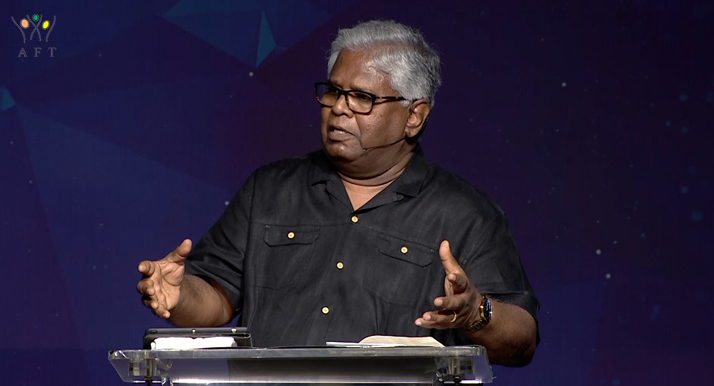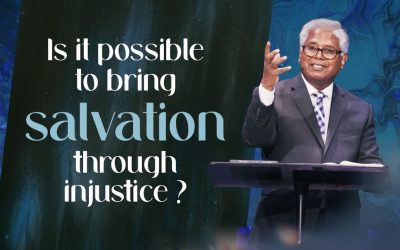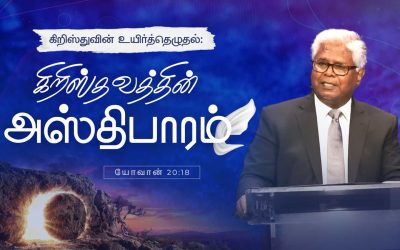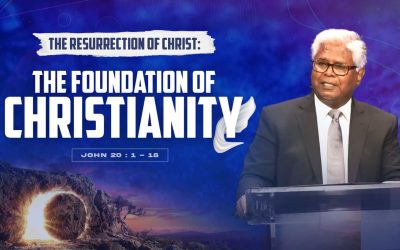
Easter Sunday 2021, Message – A Body of Flesh and Bones
Easter Sunday English Service – 04 APR 21
Transcript
Please turn with me to Luke’s Gospel, chapter 24 and let me read to you, from verse 37 to 43; Luke 24, verse 37 to 43: But they were terrified and frightened, and supposed they had seen a spirit. And He said to them, “Why are you troubled? And why do doubts arise in your hearts? Behold My hands and My feet, that it is I Myself. Handle Me and see, for a spirit does not have flesh and bones as you see I have.” When He had said this, He showed them His hands and His feet. But while they still did not believe for joy, and marveled, He said to them, “Have you any food here?” So, they gave Him a piece of a broiled fish [k]and some honeycomb. And He took it and ate in their presence. Today, being Easter Sunday, I want to share with you an Easter message. This passage that I just read to you, I think, is written specifically for people who have a difficulty in believing in the resurrection of Jesus. Certain details are given here, just to make sure that they understand that the resurrection of Jesus did happen and it literally happened.
Now, the average modern person today, is actually very comfortable with the message of Easter because they have become very modern. They know how to handle a situation like this. So, the way they handle it is this. The reason I say they’re comfortable with this is, they’re not offended by the message of Easter; they don’t get annoyed by the message of Easter; they don’t find it, terribly lacking in sense, and so on. They say, “It’s good; we like Easter also, we celebrate Easter also, in a way, because Easter has a message behind it. That message is very important”, they say. “Whether it actually happened or not, is not so important; the message behind Easter is very important”, they say. And what is the message? They say, the message is something like this: after a disaster, usually there is a new beginning. They say, after darkness come light, like we read in the Psalms: Weeping may tarry for the night, but joy comes with the morning. So, usually when weeping comes, it only lasts for a night, then joy comes in the morning. So, resurrection is like that; after darkness there is light; after a disaster, there’s a new beginning; after death, there is life. You know, sometimes, after somebody suffers a great loss and they’re grieving over a death, then a child is born. It kind of seems to make up for what is lost. And they say, “Well, we were feeling very sad but now, we have a great joy; we have a child born. Wonderful”, they say. So, Easter is a positive message, like that, they say. “So, whether Easter literally happened, whether Jesus really died and then He rose again on the third day, is immaterial”, they say. The message is important.
Now, that sounds all very good. Sometimes people get cheated into believing something like this but it is totally wrong to think like that. Now, these days, even seminaries, where they don’t believe in the literal resurrection – bodily resurrection of Jesus – they do not teach, bodily resurrection of Jesus or any kind of miracles. And people that come from that kind of training and background, they teach like this: they preach lofty, spiritual messages; they spiritualize the resurrection. Just like we spiritualize any miracle. Instead of taking it literally, they spiritualize. They say, “Well, the spiritual message is more important than the actual thing. Whether the actual thing happened or not, is immaterial”, they say. But that is wrong. See, such people, when they believe like that, they feel very comfortable with the Easter messages. The Easter message doesn’t jolt them in any way, but look at the reaction that the original disciples of Jesus had, when they were faced with the resurrection message. Just look at the passage; look at some words there – words, such as, for example, in verse 37: “Terrified”. I’m looking at New King James Version, so let me read the words that are there, in my translation. You’ll have in your translator, slightly different words – terrified; frightened – this is their reaction. Because how would you feel, if a person was dead three days ago, all of a sudden, appeared in your room, especially when the room is closed. And He didn’t even knock and nobody opened the door, and all of a sudden, you find Him standing there, and He’s saying, “Peace be to you”. And they lost all peace, you know. They’ve gone to pieces; so, frightened and terrified, is the reaction. I’m not surprised at all. I’m sure we will feel the same way. We’re starting to see, how real it is; the description and the narrative, is so real. It is not something that was made up.
The next words that I want you to notice are the words, like, what is found in verse 41. “They still did not believe…” that is unbelief was there; that is the reaction. And their “joy”, is an opposite reaction; it’s a positive reaction. “Marvel”, is another good reaction – marvel. And so, these are the kinds of reactions that the apostles had – the disciples had – frightened, terrified, filled with unbelief, joy, marveled at what happened, and so on. A kind of mixed reaction; some positive and some negative; unbelief is negative but joy is positive. So, it’s a mixed reaction. But these people that do not take it literally, they spiritualize it. They’re not jolted by it at all, they’re not shocked in any way, neither are they marveling at it, there’s nothing to marvel, there is nothing to be shocked at. There is nothing to be joyful about. They take it very casually, they feel very comfortable with this whole thing, because they don’t believe it, literally. They don’t believe that there was a real, physical, literal resurrection. They think the resurrection story, was built over a period of time, morphed over the years. They think that the disciples were very fond of Jesus, therefore, after He died, they started talking about all that He did, by way of His great deeds and teaching and so on. And the more they talked, the more they came up with certain details and so on. And very soon, the stories were turned into a story of physical resurrection. It kind of so happened, they built it over a period of time. Finally, they ended up saying, that He was resurrected; whereas He was not resurrected. That’s the way they explain it. Now, you’ve got to go to a seminary for about 10 years, in order to explain it like that. But if you read the story straight from here, it seems, it is so real. There is a great difference between a made-up story and a real story; between a report and a legend. A legend is different. You know, when people write a story that’s a made-up story, they say, “Long, long ago, so long ago…”, but nobody knows how long ago, because it never happened. That’s the way the story begins. There was a king in a certain town, they say, but who is that king? What is his name? What is the name of the town? They don’t have the name of the town, because the story is just a made-up story.
In the Bible, when you read passages like this, you see signs of reality. Signs that clearly tell us, that this is not something that somebody made up; it is not something that has been built up, over a period of time; something that turned into some resurrection story, as some say. It is something very real, very natural, just like I said, the reactions are very natural. If it happened to us, we’ll be terrified and we’ll certainly be frightened also. Certainly, we’ll have joy, we’ll have amazement, wonder, and we’ll have some unbelief also. We’ll find it very difficult to believe. This is exactly the kind of reactions we’ll have. The way it is written itself, tells us, that it’s very real, you know. Somehow, people fail to notice all these things. But when they were still filled with unbelief, Jesus asked them, if there is anything to eat. This is very interesting. He asked them, if there is anything to eat, and they say, “Yeah, we have something to eat”. And they give Him a piece of broiled fish and some honeycomb – look at the details. Made up stories don’t have this kind of details. They gave Him broiled fish – broiled fish is directly heated from the fire and honeycomb. And it says, “He took it and ate it in their presence”. So full of details, very natural it sounds but somehow, people have such a difficulty. They say, “No, I can’t believe it”. And Jesus insists that this is Him, risen again. He literally says, “I’m not a ghost; I’m not a spirit”. He says, “The Spirit doesn’t have flesh and bones, like I have”, He says. And then at one point, He says, “Touch me, feel me, see. Touch my flesh, touch my bones and see for yourself, whether it’s Me”. So, you can see that it’s so real, unbelievably real. But somehow, people don’t want to consider that. But that is the whole point I want to make today. That this risen Christ, who insists that they touch Him and see and so on, because He’s got flesh and bone body and “a spirit does not have flesh and bone body”, He says. He demonstrates that He is alive, in a body, in a literal body, by eating and having this ability to eat and so on. So, the whole point that He’s making is, that to really say that He is risen from the dead and He’s really risen in His body, is a bodily resurrection. He insists on the flesh and bones that are there, in His body. So, I’m going to talk about flesh and bones today.
Now, if Jesus has His flesh and bones, in what way does it affect this message, to say that Jesus has flesh and bones in His body? There are three things, that you will have to believe, if it is true that Jesus rose again, in a literal way, with His body – flesh and bones – there. Then, there are three changes, that will happen in you and me, if you believe that. One is: It changes our thinking, and I’ll explain it in just a few minutes. It’ll change the way you think; your orientation will be changed. Secondly, it’ll change the way you live; it will change your life. Thirdly, it’ll change the way you feel; it’ll change the way you experience Him in this world. So, let’s talk about these three things; it’s very simple truths, but you’ll be surprised, how much it matters, that He had a flesh and bone body. This is not given just for filling the page, but it’s a such an important thing. And so, let’s look at it.
It changes your thinking, I said. So, resurrection of Jesus has implications for our mind. It changes our thinking. In what way? If it is true, that He truly rose again and had a flesh and bone body, then that would mean, that He is the Son of God and He is Lord and He is God. It means He’s Lord. Now, this comes out very clearly at one point, in Acts, chapter 17. Let me turn to that very interesting passage. Acts, chapter 17, where Paul is preaching in the city of Athens, known for its philosophy. In Acts, chapter 17, verse 22, Paul begins. It says, “Then Paul stood in the midst of the Areopagus and said, “Men of Athens, I perceive that in all things you are very religious”. Now, Areopagus is where the Mars’ Hill, is there. A place called, Mars’ Hill there, where, there was a stage put up permanently, so that, anybody that has anything to share with the people, especially if it’s something new, a new thought, something that nobody has heard, the Athenians were very interested in hearing that. They liked new thought; they have itching ears, you know, they wanted to hear something new; very interested in new kind of philosophy, ideas. So, the stage was put up there permanently. Actually, in our country, I went to a state and when I landed there, they picked me up and they would take me to the hotel. On the way, the man showed me a place, where there was a big shed put up, in a very central place in the city. A shed put up, on the side of the road, and all kinds of arrangements have been made – chairs there and drinking water – all arrangement have made, by the government itself. And he said, “In our city, there’s a strike going on, every day”. Somebody is striking, some companies, some government offices, something is striking. So, they made this facility permanently. Anybody that wants to strike, you know, everything is already set up. You’ve got chairs, you’ve got water, you’ve got all the facilities, you can sit there and shout down-down and all that business, all day. And next day, someone else will come with their issue.
So, in the Athens, it was a place of philosophy, known for its interest in philosophy and learning. So, these guys came and gave big lectures on this place called Mars’ Hill, in the stage that is put up there. So, Paul goes there and he stands and preaches from there. Look, this is one of the biggest examples on how to preach, in a multicultural, in a multi-religious society, without offending others; a great example. He says, “I perceive that in all things you are very religious”. He first appreciates the religiosity, says, you’re a very religious people; I like that. How does he know that they were religious? He says, “For as I was passing through and considering the objects of your worship, I even found an altar with this inscription: TO THE UNKNOWN GOD”. What is he saying? He’s saying, “Well, I went around your city, I saw the objects of your worship. You’ve got a lot of temples; you’ve got a lot of places of worship, a lot of altars. One altar said, ‘TO THE UNKNOWN GOD’”. Then he says, “Therefore, the One whom you worship without knowing, Him, I proclaim to you”. That’s how he begins; very clever. How did they come up with this ‘Unknown God’ altar? See, they’d put up altars for various gods, because they believe in multiple gods. And then, they thought about it and maybe someone mentioned, maybe there is a God somewhere, that we don’t know. We have missed it. We have put up all these temples; we’ve got all these altars, but still, there’s a chance that we’ve missed the true God. What if He happens to be the God and you’ve been worshipping all these others, and left out the real One? So, let’s put up an altar called, ‘Altar to the Unknown God’. And so, they put up an altar to the Unknown God and they started worshiping there also. By chance, if there was a God somewhere, that they didn’t know about, that will cover that; they wanted to safeguard everything. And Paul preaches from there. It’s a very religious society and Paul is preaching from there.
Look at verse 24: God, who made the world and everything in it, since He is Lord of heaven and earth, does not dwell in temples made with hands. Now, notice, he’s preaching and every point of his preaching, basically, disagrees with what they’re doing. But none of them are offended; they’re not stopping him; they’re not objecting to him; they’re listening because they’re very intellectually oriented. They want to listen to an argument, if that has any validity. So, they’re listening to him. He says, “God doesn’t dwell in temples; God could not be dwelling in temples, because God is the maker of heaven and earth. How can you fit Him into a small temple? You built the church like this, you can’t fit God into a place like this, even if you built a church 10 times bigger than this, you can’t fit God into that because God is bigger than anything that you’ve got in this world. So, God cannot dwell in temples.” And they think, this guy is right; he’s talking sense. He’s talking some sense to us. So, even though we are putting up temples and we’re worshiping, let’s listen to this guy. So, they’re very reasonable people and they’re listening.
And then, in verse 25, he says, “Nor is He worshiped with men’s hands, as though He needed anything, since He gives to all life, breath, and all things.” He says, “God is not worshipped with men’s hands, as though He needed anything, since He gives to all life, breath and all things”. You don’t need to do anything to God; God gives everything to us. So, there is no way that you can do anything for God. And then, he says (verse 26), “And He has made from one blood every nation of men to dwell on all the face of the earth, and has determined their preappointed times and the boundaries of their dwellings”. God has put people everywhere, all over the world, situated them, determined the boundaries of nations and so on. Then he says, “So that they should seek the Lord, in the hope that they might grope for Him and find Him, though He is not far from each one of us”. It’s God’s desire that men should seek Him and find Him. So, these people are seeking God, that’s why they’ve got so many temples, that’s why they’ve got so many different methods of worship, so many altars, they have covered just about everything. And for what, they don’t know. They’ve got an altar for an Unknown God. So, he says, “God wants you to seek Him, and I’m glad you’re seeking him. You’re a very religious people; you’re seeking God. God wants you to seek Him and find Him. That’s God’s will. And God is not far from us”. How far is God from us. He says, in the next verse, “For in Him, we live and move and have our being”. We are all situated in Him. “We are all in God”, he says. As also some of your own poets have said, ‘For we are also His offspring’. See, he’s a man well-versed with the Greek culture, Greek language, Greek poets and Greek philosophy.
I’m doing Bible study, these days, on Tuesday nights on Apostle Paul. It’ll be very useful, if you heard that, to understand the New Testament, because Paul wrote nearly half the New Testament. There, I speak about some of those things. He’s very well-versed in Greek culture and so on. So, he’s able to quote from their poets, like, if you spoke to Tamil people and if you quote [Tamil], you know, but you’ve got to know [Tamil]. You’ve got to know [Tamil] in order to be able to quote. So, he’s well-versed with the culture; he can interact with these things; he can interact with their philosophy; interact with their poets and so on. And what a great way to preach to people, that do not know anything about Christ. He says, in verse 29, “Therefore, since we are the offspring of God, we ought not to think that the Divine Nature is like gold or silver or stone, something shaped by art and man’s devising”. See, they have made things, that represented God, with materials like gold, silver and stone. He says, “God created gold and silver and stone and all these things. You cannot create God with that”. Again, they are doing something and he’s speaking, exactly the opposite. They’re not objecting because they say, “Yeah, this guy makes sense. God made gold and silver. How can you make God with gold and silver?” They say, “Yeah, yeah, we agree.” They are so philosophically oriented; they agree with him.
And then, verse 30, I want you to notice, when they begin to stop him, when they begin to stop him, was 30, Truly, these times of ignorance God overlooked, but now commands all men everywhere to repent. Now, he’s getting into the subject. He says, “So far, God, in the times of ignorance”; he says, “God overlooked, for over many centuries, God overlooked the mankind, and their violations against Him because they didn’t know God; they’re lost. They’re searching; they’re not able to find, no matter how much they search, they could not find God. And so, God overlooked but now commands, men everywhere to repent”. In other words, he’s saying, “Now, things have changed; something has shifted now. Now, God is not overlooking everybody’s sin; God is going to hold you accountable for your sin, because something has happened, significantly, in the recent times. Therefore, God does not overlook your sins anymore. He commands everyone, men to repent everywhere”, he says.
And then, verse 31 says, “Because He has appointed…” – why you should repent? He says, “Because He has appointed a day on which He will judge the world in righteousness by the Man…” with a capital ‘M’- by the Man – he’s talking about the Man, the God Man; the Man who came in flesh, is God in flesh – that Man, he’s talking about. He says, “God is going to judge the world, by the Man whom He has ordained. He has given assurance of this to all, by raising Him from the dead”. He comes to the centrality of the Gospel; he brings in Jesus. He says, “By this Man”; this Divine Person, that came as a Man into this world. God is going to judge this world. How do we know for sure, that He’s going to do it? He has ordained Him to be the judge over this world. If you’re going to be judged over the world, He’s got to be something more than just a man. He’s got to be God, in order to be a judge. That’s what he’s implying – this Man, is God. He’s saying, in other words. He has ordained Him to be the judge. It is given assurance. How? Assurance of this, how? By raising Him from the dead. In other words, he’s saying, “Look, God sent this Divine Person, His Son, into this world and the world rejected Him. He came into His own; His own received Him not. He was crucified on the cross. The world rejected Him. He is God in flesh. The world rejected Him. He is the person that God has ordained, that will judge the world tomorrow. Why He will judge the world? Because nobody, on the judgment day, should say, “Who’s God to judge me? He’s living up in heaven, He’s living in style. And here I am slogging, and I am struggling so much, and I’m going through all these issues, having to face all these troubles in this world and life in this world. That is why I did this; that is why I did that. I violated God’s laws so many times because there was a reason for it. Life was so tough; I couldn’t do it without committing these sins. Therefore, God should understand. How will He understand, if He is a God, who’s a spirit, who lives up in heaven, up there, and me down here? How will He understand the person who lives down here, on this earth? That’s why God says, “No, I’m not going to judge”. A Person who came down to earth, experienced all the injustice, experienced all the trouble that He could experience, as a human being, suffered and died on the cross for no sin of His at all; never did anything wrong but suffered and died. That Man will judge the world”. You can’t stand up to Him, face-to-face and tell him, “You don’t understand our problem; you don’t understand our world; you don’t understand our difficulties. You have no right to judge us. You have no right to condemn us”. That is why God has appointed and ordained Him to be the judge. And they killed Him. And he says, “God has given us assurance that they are going to be judged; the world is going to be judged”. How did He give the assurance? By raising Him from the dead.
Now, he’s touched a nerve that they don’t like to touch, you know. That is where they stop him from preaching. Look at the next verse: And when they heard of the resurrection of the dead, some mocked, while others said, “We will hear you again on this matter.” They said, “Enough for now; we don’t want to hear you anymore. We heard, so far, pretty reasonable, pretty logical, good philosophy. But now, you’re talking about this Man. Now, you’re talking about how God raised Him from the dead and now He’s going to come and judge us.” They stopped him; they didn’t want to mess with this anymore. It says later on, that Paul left, and some people that heard him that day, believed and followed him. And there are others who said, “We’ll hear you again tomorrow; we don’t have time for this now”. In other words, they said, “Just stop it; it’s enough”, you know, “we’ll hear you again later on”.
What is the problem with what he said now? They agreed with all the rest. They were so reasonable; they were able to think it along with him; they were reasonable people. Why they take this fact of this resurrection of this Man, this Divine Person? Why couldn’t be accept the proof of His resurrection because He has appeared to so many? On one day, He appeared to 500 people; the disciples have seen Him. Paul writing about the appearance of Jesus, after His resurrection. In 1 Corinthians, chapter 15, he writes something like 20 years after the resurrection happened. I think 20 years later, he says, “He appeared to 500 on one day, and among the 500, most of them are still alive, only few are dead”. And nobody raised an objection. “Most of the 500 are still alive”, he says. They saw Jesus with their own eyes. They know that He’s alive. Nobody raises an objection. So, in other words, it’s not like, you know, there was no witness and Paul is just talking all nonsense and nobody knows what happened. That’s not like that. In town, there are 500 people that know; they’re eyewitnesses to His resurrection. Most of them are alive, and they will testify to it. Why wouldn’t they accept? Why wouldn’t they believe? What is wrong? What is the objection? Why don’t they want to believe in the resurrection of Jesus? I’ll tell you why… If they believed that God raised Him from the dead; if they believed that the Jesus, who died was risen again, and now, He’s got a glorious body – flesh and bone body, undying body, a body of glory and honor; if they believed that He will live forever more and that He is alive, then they will have to logically admit that He is Lord, and accept Him as their Lord, as their judge and follow Him as their Lord and submit to Him as their Lord and their Savior and repent and join Him. That’s the problem. They like to keep their stance, philosophically, where they say, “Well, we’re all searching; you’re searching; I’m searching. You have your own god; I have my own God. You have your own way; I have my own way; everybody’s got their way; there are 1000 ways. But we’re all very religious people”. Wonderful, you know. “We’re all very religious-minded; we’re pretty good people. We’re all searching; who knows which one is true. Let’s continue like this all the way to the end”. They like that better. But that’s when you have to come to a conclusion. If you accept the fact of resurrection of Jesus, that it literally happened and that Paul is one of the eyewitnesses. And there are other disciples that are eyewitnesses; other 500 that are eyewitnesses that was there, at the time of this writing. They’re alive, they could bring anybody and ask. They will tell, if they’re truly interested, nobody was interested. Some people believed and so on, but a lot of people didn’t believe. Because if they believed, then they will have to accept Him as Lord and Savior. That’s the problem. The search will be over, if they accept the resurrection of Jesus. They can’t say, “We’re still searching for God”. So, we have all these temples and so on.
See, in the Tamil world, there is a proverb; I can’t say it in English but I’ll say it in Tamil and explain it. They say, ‘ondre kulam’ means, there is only one kind of people, that is mankind. But we have thousands of castes. Right. Linguistic groups, ethnic groups, and so on, caste and so on. But our leaders have said in the past, there’s only one kind of people, ‘ondre kulam’. Nobody objects to that; everybody accepts that, even though, they believe in all these different castes, and the castes are a reality. People believe, yes, there is only one kind of people, that is mankind; they believe that. The same people that say there is ‘ondre kulam’, they also say, ‘oruvane devan’. Just like you say, ‘oruvane devan’, but there are thousands of gods, now you say, there is only one God, but actually, in reality, you know that there are so many gods, that people claim to be gods. But still, people accept that. They say, “Yeah, that’s true. ‘ondre kulam’ is correct. ‘oruvane devan’ is also is correct. Everybody will agree with that. I’ve heard it, ever since I was a little boy. I’ve never heard anybody get offended by that. Even people that believe in multiplicity of gods and worship many gods, agree that, there is only one God. Then why do you worship so many gods? They will say, “Because, who knows, which one is right?” Maybe this is right, that is right, yours is right, mine is right, you know. We’re not sure, so let’s worship as many as possible; there’s nothing wrong in worshipping as many as possible because we really don’t know. That’s the problem. So, they’re agreeing with the ‘One God’ concept, but in reality, they’re believing in worshipping so many gods, that’s the way things go. That’s the way things were going in those days back in Athens.
Now, this preacher, this Christian preacher, confronts them. He says, “Hey! You’re all good people; you’ve been searching for God; you’re very religious people; you’re very religious-minded; you wanted to know who God is, and God also wants you to search and know, but you’ve not known all this time. But I tell you, I’ve put before you, this fact, that God came into this world as a Man. This Divine Person came into this world, they rejected, Him crucified on the cross and God raised Him from the dead”. So, God, who all this time, was overlooking man’s sin, is now calling all men to repent because now, you got to repent and come to Him, in order to be saved from your sins and be forgiven of your sins. And that is why this Man, this special Man, this Divine Person, did not say, like other religious teachers, I’ve come to show you the way. I will teach you the way; I will guide you through the way to God. He said, “I am the way”. That is why this Divine Person did not say, “If you follow my teaching, you will arrive at the truth.” He said, “I am the truth”. That’s why this Divine Person did not say, “If you follow me, I will take you to where life is”. No, He said, “I am the life”. It’s a big whole world of difference. “I am the life and the way, the truth and the life”, He says. And “His resurrection is proof that He is Lord”, Paul says.
Now, you may say “Well, so many people have been resurrected; even Jesus raised some people from the dead”. There are other prophets, Elijah and Elisha and them, they raised from the dead. What’s the difference between dead that were raised in those cases, and the resurrection of Jesus? In what way is this so special, that it becomes the proof, that He is the Son of God and that He is God? There is a big difference. For example, take the example of Lazarus, who was raised from the dead; Jesus raised him from the dead. Jesus comes and stands at the grave, and He shouts, saying, “Lazarus, come forth!” And he comes forth, but he does not come forth without the help of others, removing the stone. They had to remove the stone, otherwise, he cannot come out. And he cannot even get up from where he was laying, as a dead person because he was bound with grave clothes. They bound him very tight with the embalming stuff and all that, hands, legs tied, everything bound, laying there. So, somebody had to get in there, turn him loose, so that he can start moving, otherwise, he couldn’t do anything. That’s how he came out. The stone had to be removed; the clothes had to be removed; the things that were tying him up had to be removed. And then he came out.
How did Jesus’ resurrection happen? The stone that was covering the grave, was removed, but not for Him to come out, but for others to go in – whole world of difference. Others to go in and see, the stone was removed. By the time they went in, saw, that He was not there. The angel was going to tell them He was not there but how will they believe if it’s closed? So, the stone was removed, to show that He is not there. And in the place where He was laying, as a dead person, the grave clothes were all neatly arranged and kept; folded and kept. What has happened is, He was in these grave clothes and He just came out of it. That’s it. His death, His resurrection is totally different. And there, He appears in a closed room, without even knocking on the door, without bothering to open the door; He’s there, appearing before them saying, “Peace be to you”. He got out from here, without the stones being removed; got out of his grave clothes, without any help. That’s the kind of resurrection this was. What does this tell us? That this resurrection is totally different. In what way, different? This Jesus, the Son of God, this Divine Person, defeated death, conquered death, and came out victorious from death. He rose again from the dead, defeating death and came out of that death. Peter preaching says that hell could not hold Him. They could not keep Him. He took the keys of hell and the grave, and came out. So, this is a totally different kind of resurrection. He destroyed death; it was the death of death and in that death, or the resurrection of Christ, death was destroyed. That’s the way the Bible teaches us. And John, who met Jesus after He was risen, meets Him again, many years later. In Revelation, chapter 1, verse 17, we read – look at the reaction of meeting Jesus. This risen Savior, in all of His glory, he meets Him and look at his reaction: And when I saw Him, I fell at His feet as dead. That’s what will happen when you meet the resurrected Christ. He laid His right hand on me, saying to me, “Do not be afraid; I am the First and the Last. I am He who lives, and was dead, and behold, I am alive forevermore. Amen. And I have the keys of Hades and of Death”, He says.
John says it again, in 1 John, chapter 1, verse 1, where he talks about how he has preached and taught Christ to them. He says, “That which was from the beginning, which we have heard, which we have seen with our eyes, which we have looked upon, and our hands have handled, concerning the Word of life…” He’s talking about Jesus, like that. He says, “Jesus is One we’ve heard, personally; we’ve seen, personally, with our own eyes; we have looked upon, and our hands have handled Him”, he says. We’re not talking about the resurrection of Jesus, without personal knowledge, of the fact that He is risen. “That He is risen, indeed, in His body”, he says. That is why the resurrection is a problem because if you admit to the resurrection, then you have to admit to the fact that He is Lord and He is God, and you’ve got to submit to Him, and so on. That’s the problem. That is why, they had to object and they had to stop him.
Now, there are only two options available. Once this truth about His resurrection is playing, only two things a person can do. One is, you can say, “Yeah, I believe”. People in Athens, some of them believed, it says in the last verse, in 17th chapter. Some of them believed; some people up in the authority, they believe and they followed Paul. So, that is one option: you can believe and accept Him, as your Lord because there is enough proof.
Secondly, there is another option, and that is to say, “Well, I don’t believe Luke; I don’t believe John; I don’t believe Paul; I don’t believe Peter; I don’t believe no one; I don’t believe the 500; I don’t believe even if 5,000 come and tell me, that He was raised from the dead. Even if they said they heard, they looked, and they held Him, and so on. I don’t believe it. I choose not to believe it”. That’s up to you. You don’t have to believe it. So, there’s one option, that you believe and follow Him. You give yourself to Him and make Him your Lord. The other option is, you totally reject Him and say, “You’re all liars”. And go your way.
But the third option is not possible at all. The third option is the thing that I mentioned first. There are some people saying, “It doesn’t matter, whether Jesus rose again or not, there is a message; the message only matters”. That nonsense you’re going to talk here, that option is not available; you cannot talk about that. That is not possible at all; that you cannot bring up at all. For that you have to go to seminary for 10 years, to train to talk like that. That is not possible; you have to either believe and accept Him or reject Him completely. Those two options are available. Alright.
Secondly, secondly, the resurrection of Jesus Christ, changes the way you live. In what way does it change the way you live? It changes the way you live, because you have a whole new way of relating to the world. When you understand that Jesus has risen with the flesh and bone body, that His body is real, you’ll relate to the whole world in a totally different way. Why? Because if Jesus rose with a flesh and bone body, then it means, that your future, is a physical future. Just like He rose with a body, you’re going to, one day, rise with a body, and you’re going to live eternally, with your body. So, your future is going to be a physical future. The Bible is not saying, you know, God is going to redeem us and take us away from this world. See, some Christians even think that the world is a bad place; we need to get out of here and get into heaven, you know. The Bible is saying that the material world is so important. How important? It’s important because God made it. In Genesis, chapter 1, where the creation story is told, seven times it says, “It was good”. Whatever He created, was good. Everything material, was good. This thing that says, ‘material is evil’, anything that is part of the material world is evil, is a Greek philosophy; it’s not Bible. The Bible says the Jews will never believe it; the Jews believed that a God-created world, is good. It’s a good world. But what happened to the good world when man sinned, not only man and mankind through man, plunged into sin. But the world also was plunged into sin, so that today, the redemption that is given to us, is not only the redemption of man from his sins, not only are his sins forgiven, that he is accepted as a child of God and so on. But the world also, which fell as a result of his fall, must be redeemed. Then only redemption is complete. Otherwise, the redemption is not complete. Otherwise, God has done a half-job, if He just leaves the world as it is. “God is the Father of creation”, the Bible says.
See, when a father has children and the children go wrong, the father takes extreme measures; he’ll do anything to bring the child back in line, to restore the child, to bring the child back to a good life. He will do anything; he will give his own life to do that because he feels responsibility. He feels that the child is his responsibility; not only to feed and clothe and educate and so on. The child is his total responsibility, for whatever happens to him. Therefore, if something goes wrong, the father leaves everything and attends to this and pays attention to this; works on it until that person is restored. Where do you get that? From God. See, we are all following God, the Father. Now, some parents are not able to do anything, even though they try so hard, because the children are far gone, sometimes. They do whatever they want. But God the Father has got all power. He can completely turn around anyone and anything. So, when the world went wrong, when human beings went wrong, He took charge, He’s the great Redeemer, He started his remaining business and that is why Jesus came. He has redeemed us and Roman, chapter 8, the last few verses say, “Even the Earth is going to be redeemed”. The earth is waiting eagerly for its redemption to happen. It’s going to happen when our bodily redemption happens; the earth is also going to be redeemed, so that it comes back to the original condition, which it had a good earth, where everything is good, where everything is beautiful.
Now, you’ve got to have a right attitude about the earth, about the world, you know. A lot of people have the wrong attitude about the world; the world is a bad place; we want to get rid of this thing and go away to heaven and so on. No, the Bible doesn’t teach that. The Bible says even when we go to heaven. What is heaven? The Bible says, God is going to join heaven and earth and make this earth a new earth. It’s talking about a new heaven and a new earth and we’re going to have a physical existence there, you know. Some people think that we’re going to be floating around in lala land and saying, “Hi” and “Bye”, you know; just meeting each other, as we fly up in the air. And that’s all we’re going to exist, all through eternity. That is not true. We’re going to have a physical existence, just like I’m standing with my feet touching the ground today, I’m going to stand with my feet touching the ground, even in eternity, because I will have a flesh and bone body, just like Jesus does. That is what this whole thing implies. That is what the Bible teaches. So, once you understand that, once you know that, then, the attitude towards the world, becomes totally different.
One is, you realize that this world is not everything, that there is. There is something better coming. God is going to renew this world, redeem this world, make everything better. So, this world is not everything there is. There’s a lot of people that live as if this world is all they’ve got. One fella, I remember, saying, “Well, we have one life, brother, just one life. We just go one round, and you have only so many years”. So, he said, “Better start enjoying it; enjoy everything. Enjoy every kind of food, every kind of thing, do everything that you imagine, that you want to experience and do because you don’t have many lives. You just have one life. So, you’ve got to be very alert and just not miss anything because once this is over, finished! This is all we have! Once this life is over, it’s all finished!”. Because he’s thinking, then we’re going to float around, you know, in heaven somewhere, life is not going to be like this. All the pleasures, all the enjoyment, everything, will be gone. There’s nothing. This is it; we’re finished, he thinks. So, he’s on a search, to go and find anything and everything and enjoy and experience everything. But the Bible says, “Relax, man. Don’t be in such a hurry to enjoy everything because this is not the only world you have. Something better is coming, actually. What you’re enjoying right now is nothing compared to what you’re going to enjoy, in the coming world. That’s what the Bible teaches.
A very interesting, C.S. Lewis quotation and let me read it to you and explain it to you. C.S. Lewis is a great author, the British author, very profound writer. He says, “The faint, far-off results of those energies which God’s creative rapture implanted in matter when He made the worlds are what we now call physical pleasures” … Kind of a little difficult to understand because he loads so much into one sentence. Let me explain that. What he’s saying, in essence is, when God created the heaven and earth, the Bible talks about, the Father God, and the Son, joining together and creating everything, and in passages, like Proverbs 8, where it talks about the Father and Son frolicking, literally enjoying and delighting in the creation, every aspect of the creation, every little part of the creation. As they created, they were so overjoyed by the potential of the creation. Every fruit, every tree, every music and art and all of these things, came from God. As these things were created, God and His Son enjoyed it so much, they were literally delighting in it, and rejoicing in it. These words are used there, in many passages, and it was like an explosion of joy. It was like many bombs going out, you know. It was an explosion of joy, indescribable joy, over what is going to happen. So, what C.S. Lewis is saying is, what you’re experiencing now, as physical pleasures, are faint, far-off results of those energies. In other words, the joy that God experienced, when He originally created music, for example. Now, when you play music and you say, wow, what nice music. Have you ever heard some nice music and sat there and heard it a hundred times? I’ve done it. Your hair will stand up and you say, “Oh, my God, it feels so good, so nice”. That’s pressure, right. So, what C.S. Lewis is saying is, that is a faint, far-off result of those energies which God’s creative rapture. See, God was in rapture, when He created; that means, He was so thrilled. “…That God’s creative rapture implanted in matter, when He made the worlds” And those far-off results, faint far-off results, are the things that we call as physical pleasures. I hope you got what I’m trying to say. It says, what you’re saying is, such amazing physical pleasure, that just thrilled you, whether it’s music or whatever it is; whatever it is that thrilled you, it is a faint far-off result of those energies which God’s creative rapture implanted in matter. That’s what we call physical pleasures. They are such miniscule portions of the original pleasure, that God intended for you to have. God experienced that. And what he is it mean is that, when we get into eternity and live with God, you’re going to enjoy it to that level; in God’s level.
So, for all those people, that want to make sure that they enjoy every pleasure, in this world and not miss out on any pleasure. He is saying, don’t go around in a hurry, trying to enjoy everything. You’re not missing anything. Just be in Christ and follow Him and stay in God because you’re going to enjoy a million times more, of the same thing, this pleasure, that God intended for you. What you’re enjoying now, is just a small portion of what originally was designed. Amen. Just think of it, just meditate on it; you’ll get an enlightenment of it. It’s amazing.
So, finally, the third one; the third thing. The third thing is, the resurrection of Jesus has implications because it changes what you feel. That means, it changes how you experience God in this life, right now. How do you experience God? Say, for example, when Jesus was risen, Mary Magdalene and the other Mary went and cleaned. They clasped His feet, and they were worshipping Him. But one time, Jesus said to Mary Magdalene, “Don’t touch me. I’m ascending to the Father”. Now, a lot of explanations are given to it. I think one explanation is this: why did Jesus say, “Don’t touch me, right now”? Was He meaning that you are a sinner and I’m so holy; I’m going into God’s presence and if you touch me, then everything will be ruined? No. What He is saying is, Mary, you’ve been looking for Me and as soon as you find Me, you want to get a hold of Me because you want Me. You want to love Me, you want My compassion, you want My love, you want Me to hold you. You want Me to be with you. That is why you’re coming and clasping me. But Mary, don’t touch me; you don’t have to do this hereafter because things have changed. I’ve risen; I’m going, ascending to the Father. From now on, you don’t have to come looking for Me, so that you can touch Me and receive something. From now on, if you simply believe in Me and everybody that believes in Me, and everybody that trusts Me, and believes in Me as their Lord and their Savior, you will personally experience Me, just like you have experienced Me when I was here on this earth, personally with you. If I held you, what will you experience? That is what you will experience. If you just believe in Me, you will experience that.
So, today, we live in a time, where we don’t have to run here and there, to get something. Wherever we are, there God is with us; He will never leave us nor forsake us. Amen. Never leave us nor forsake us; that’s one example, before we close. Suppose there’s a father, a mother and there’s a son. Sometimes, you know, a son will never take care of his room and never do anything and so on. And that’s quite normal; they’re kids, you know. And so, the mother is easily upset. He’s not even keeping his room clean; not making his bed; not putting his stuff in place, where it belongs and always complaining. But the kid grows up; he goes to college, somewhere else, foreign country or some other city. He’s gone away. Now, the mother walks into the same room; she doesn’t feel like complaining now, because she’s missing him and she likes him. So, she’s not complaining about, how this guy is not doing anything. She’s fixing his bed even though he’s not going to come and sleep there. She wants to keep everything clean and she wants to, you know, because she’s got him in mind and she likes him, you know. But have you seen in places, where such a son dies, sometimes, and what causes? There are people that will never remove one little thing from the spot where it was, on the day, on, on that last day, when he was alive; they’ll keep it as it is, because they want to remember him. They revere his remembrance; they want to protect his memory; they’ll do everything to keep everything, as they are, so that they can keep thinking of him, right, because he is now dead.
Now, when Jesus died, during that period, they say there was at least 50 tombs that were very specially cared for and very specially made, for significantly famous people, well known people in the area, where Jesus’ body was buried – 50 tombs, very famous people, like Jesus. So that years later, they can go and say, this is so-and-so’s grave; this
is David’s grace. I like that, you know. Centuries later, they’re going to go and say that. But till this day, nobody could find Jesus’ grave. If you went to Israel, trying to look for the Jesus’s grave, they’ll show you one for $20. The tourist guide will show you some spot and say, “This is where His body was laid”. But nobody knows. They said, “Nobody knows where it was laid”. Why? Everybody’s puzzled. Why? Jesus – such a big personality. He was three days in that grave; that grave should’ve been preserved, so that we can garland it now and then. We can go and have a priest pray sometimes; have a little meeting over there and do a fasting meeting there and do this and that. Why have they not preserved that place? We should have gone there on vigils and stayed there and done all kinds of things. It would’ve been wonderful, if they preserved the place, where He was buried. But nobody knows, where He was buried, and everybody’s puzzled, why nobody knows. You know why nobody knows where He was buried? Nobody knows where He was buried, because He’s alive! He’s risen and He’s alive! He’s no more dead. The Christians who believed in Him and followed Him and made Him their Lord and Savior, never turned back, to go back to the grave, looking for Him; never turned to go back to the grave so that they can catch His feet and, you know, worship Him or something like that. Because they know, they can worship Him wherever they are; that He is with them, wherever they are; that His presence and His power is available to them, no matter where they are. Because He’s now, in that kind of state. That is why, nobody bothered to go there. That is why, we don’t make too much of these things. Actually, I haven’t gone to Israel; I’d like to go some time, to see where – not the grave – bit where Jesus walked and so on. It must be interesting.
One fella said to me, “I’m waiting to go there and take baptism. It’s going to cost me, one and a half lakhs”. I said, “You can take one here, free. And the water is cleaner here, also”. People go there and get all kinds of souvenirs, and so on. And they market it also. They sell the stuff; you buy this and keep it there, you know. It’s going to help you and it’s going to bring you blessing and all that. We don’t believe in that, because we’ve got Jesus with us. He never leaves us nor forsakes us. Jesus is not a dead person, that we bring some relic and keep it and worshipping it, every day. No, we don’t remember Him by any kind of relic. We remember Him, because He’s risen from the dead, and His presence and His power is in our life, all the time, anytime we need; He’s there and He’s there, alive with us. Amen. Let’s all stand up together.
Well, I hope when we go home now, we can celebrate Easter in a very meaningful way. We’re not just some religious people, that are trying to follow this and that. We believe in the Jesus, who’s risen, who’s alive, who’s with us, and His power and His presence are with us all the time. He’s our Savior, Healer, Deliverer, Lord and Master; let’s lift up our hands and worship Him.
How to live by faith during evil times? | Habakkuk 1:1-17 | Sam P. Chelladurai | 7-Jan-23
தீமைகள் நிறைந்த சூழ்நிலைகளில் விசுவாசத்தினால் வாழுவது எப்படி? | Sam P. Chelladurai | 7-Jan-24 | AFT
தீமைகள் நிறைந்த...
கிறிஸ்துவின் உயிர்த்தெழுதல்:...
Easter Sunday 2023, Message...
தேவன் பேசியிருக்கிறார்! நீங்கள் விசுவாசிக்கிறீர்களா?
தேவன் பேசியிருக்கிறார்!...
God has spoken! Do you believe it?
God has spoken! Do you...
ஆராதனையின் புதிய ஏற்பாட்டு அடிப்படைகள்
ஆராதனையின் புதிய ஏற்பாட்டு...
New Testament basics of Worship
New Testament basics of...
இயேசுவில் உள்ள தேவ மகிமையை ருசித்துப்பாருங்கள்! (பகுதி 2)
இயேசுவில் உள்ள தேவ மகிமையை...
Taste and see God’s glory in Jesus! (Part 2)
Taste and see God's glory in...
















